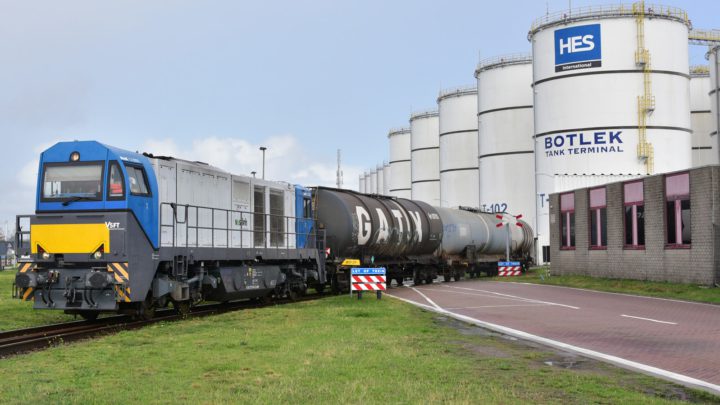
Having seen vital routes put out of action at the end of December 2022, RailGood said train operators have had insult added to injury by being asked to pay significantly higher infrastructure charges for the use of the stabling and shunting tracks.
On 28 December a leaking fire extinguishing water pipe caused flooding at the Rotterdam Botlek railyard resulting in traffic coming to a halt. On the same day, the main line to the port had to be closed, meaning that Europoort and Maasvlakte could not be reached by train.
ProRail said the flooded tracks had been recovered by 16 January. Yet while the flooding could be seen as an exceptional circumstance, RailGood said the ensuing chaos was symptomatic of a system that sees infrastructure in port of Rotterdam maintained largely “at safety level instead of at higher standards”. This leads to greater risks of unavailability and unreliability of the tracks, RailGood said in stinging open letter.
Two days later, ProRail said that the fire extinguishing facility at the yard in Rotterdam Pernis had not been approved by the competent authorities. As RailGood highlighted, “no transport activities requiring an environmental permit may take place on the tracks at Pernis” until the system meets the standard requirements.
This has a significant impact on customers transporting dangerous goods, the majority cargo in the Pernis and Botlek areas of the port, which are home to the port’s petrochemical and bulk liquids industries.
More specifically, RailGood claims that trains with dangerous goods whose composition does not change, cannot stay at Pernis for longer than four hours. Moreover, this ban at Pernis causes traffic to bunch at the Kijfhoek and Botlek railway yards, which are already dealing with intensive usage.
Excessive increase
On top of the alleged failures to keep tracks open, RailGood also slammed “an excessive increase in infrastructure charges for stabling and shunting”, which came into effect on 1 January.
Claiming that charges have risen by 250-470 percent, RailGood said: “ProRail is making it impossible for the most climate and environmentally friendly mode of transport, which also relieves the overcrowded road network, to provide reliable and affordable transport to its customers.”
The organisation is urging the Minister of Infrastructure and Water Management which has ultimate responsibility, to “put things in order at ProRail”.
“After five years of muddling through, time must be up with the mismanagement of the railways in Europe’s largest port, which are too often unavailable and unreliable and whose use has also been made extremely expensive for transporters and companies,” RailGood stated.
It pointed out shippers and logistics service providers have plenty of choice between modes of transport and ports. Movement of goods from road to rail (ie, modal shift), which is the focus of the Dutch coalition agreement and the EU Green Deal, is only possible “if the rail infrastructure is available, reliable and affordable for freight transport”.
Issues between ProRail and the regional competent authority in Rotterdam Rijnmond have been going on since August 2018, RailGood said. Since the end of August 2019, in addition to train-free periods for emergency repairs and much-needed infrastructure renewal, there have been repeated restrictions on the use of tracks in port of Rotterdam due to non-conformities with the fire-fighting water facilities and rail management.
“It is worrying that, despite a major renewal programme and excessively high investments in fire-fighting water facilities, new problems loomed again and again in 2022, including the non-wind-resistant light poles and technical problems at the Suurhoff Bridge, which necessitate single-track operation to and from the Maasvlakte in winds of force seven or higher and frost,” RailGood stated.
Subsidy diversion
Following this unhappy situation, a further bone of contention arose when Secretary of State of Infrastructure and Water Management Vivianne Heijnen announced a €10 million financing package for residents along the Brabant line.
This because of works to build an extension of the dedicated freight line Betuwe route which has meant freight trains being diverted onto the mixed use Brabant-Bentheim route, causing ‘nuisance’ to local residents.
But rail operators expressed anger that the funds were effectively coming out of a €12 million subsidy to stimulate railfreight in the Netherlands, which is being cut a year earlier than planned.
“Such incoherent policy choices are disastrous for attracting shippers to make more use of the sustainable and safe freight train,” said RailGood director Hans-Willem Vroon. “The use of rail infrastructure in the Netherlands is far too expensive and the market playing field has once again been seriously disrupted by the infrastructure charges policy of the Dutch government. As a result, rail freight transport is being priced out of the market.”
